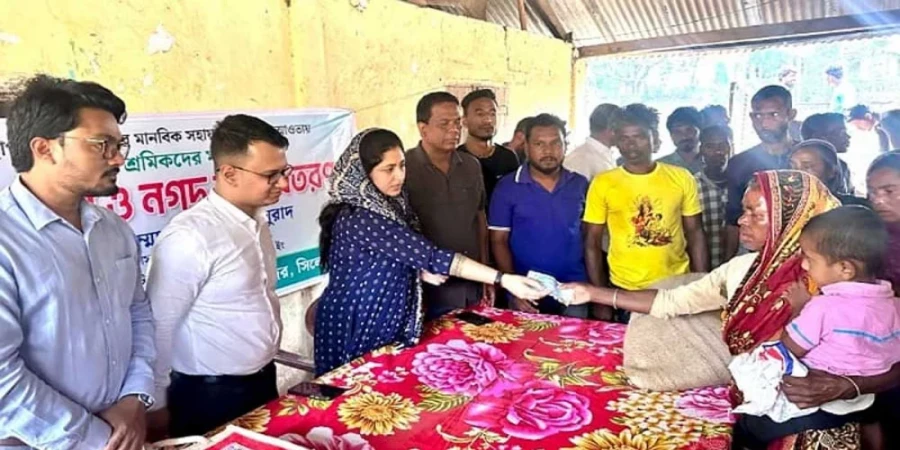
ছবি: Photo: Collected
After months of hardship and uncertainty, more than 1,400 tea garden workers in Sylhet have finally received a lifeline, thanks to the timely intervention of District Commissioner (DC) Mohammad Sher Mahbub Murad. Facing financial distress, many workers had gone unpaid and without rations for nearly 15 to 17 weeks, leading to severe hardship for their families.
Recognizing the urgent humanitarian crisis, the Sylhet DC swiftly organized an emergency relief program that was implemented on Friday (March 28). Under this initiative, cash assistance of BDT 7 lakh and 14 metric tons of rice were distributed among workers from four tea gardens — Burjan, Kalagul, Cheragong, and Factory — located in Sylhet Sadar Upazila.
The distribution event took place Friday afternoon and was carried out under the leadership of Upazila Nirbahi Officer (UNO) Ms. Khoshnur Rubaiyat. She was joined by Assistant Commissioner (Land) Md. Mahbubul Islam, Metropolitan Assistant Commissioner Md. Alim Ullah Khan, Senior Assistant Commissioner of the DC’s Office Merina Debnath, Upazila Project Implementation Officer Shirshendu Purkayastha, and local union chairman Dilowar Hossain.
Each tea worker received BDT 500 in cash and 10 kilograms of rice. While the amount may seem modest, for many of the recipients, it was a crucial support in a time of acute crisis. Smiling and relieved, workers expressed heartfelt gratitude toward the district administration. “Our DC Sir gave us rice and money. We are very happy — the entire tea garden is grateful,” said one worker.
UNO Ms. Khoshnur Rubaiyat confirmed the details of the relief, stating that the aid was distributed equally to ensure every registered worker received support. She added that this initiative is part of the administration’s broader commitment to standing by marginalized communities, particularly in times of prolonged economic distress.
For months, these workers have been caught in a financial limbo as the tea garden authorities failed to disburse wages and provide rations due to ongoing economic challenges. The situation grew increasingly dire, with workers struggling to meet basic needs, including food and medicine. Children’s education and healthcare were also severely affected.
The DC’s swift response has not only brought immediate relief but also sparked hope among the workers that more long-term solutions could be on the horizon. His actions are being praised widely as a model of compassionate governance.
While this emergency relief offers temporary relief, labor rights activists and local stakeholders stress the need for a sustainable resolution to prevent future crises. Calls are growing louder for the tea garden authorities and relevant government agencies to ensure regular wage payments and rations for workers, along with improved oversight and accountability.
As Bangladesh moves toward inclusive development, the situation in Sylhet’s tea gardens serves as a stark reminder of the vulnerable communities often left behind. However, the DC's prompt action in this case proves that empathetic leadership can make a real difference — even in the face of prolonged adversity.
repoter






